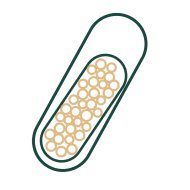Once absorbed, vitamin B5 is converted into coenzyme A which is vital for the metabolism of carbohydrates, amino acids, fatty acids and the synthesis of steroids. It also acts on the nervous system and aids in the synthesis and repair of skin and mucous membranes.
Vitamin B5 deficiency is rare, as it occurs naturally in numerous nutrients. However, food processing (refining, freezing, canning, etc.) and frying can destroy this vitamin. Deficiency may be manifested by insomnia, cramping of leg muscles, numbness or burning sensation in hands and feet, fatigue, etc.
Good for
Mental and physical energy.


